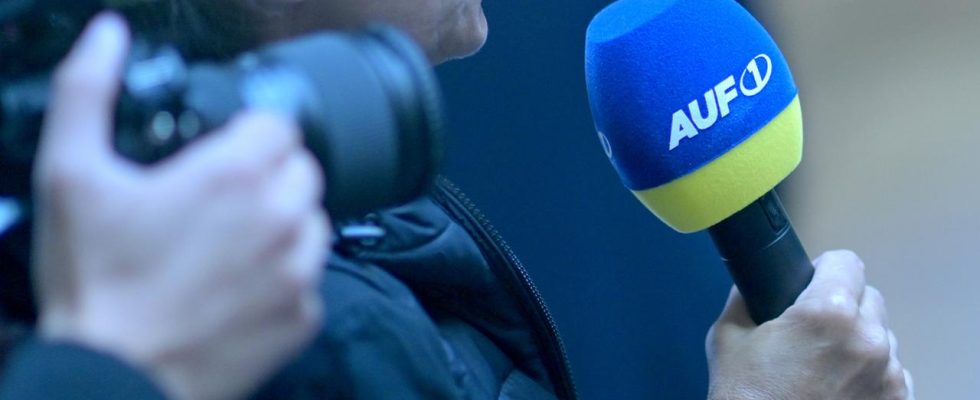The Stuttgart TV channel SRGT has to pay a fine because its cooperation with the Austrian internet medium AUF1 violated the State Media Treaty. SRGT returns its television license.
The project to create a television program from Stuttgart and Linz that could be received via satellite across Europe took around half a year. But now it is clear: The collaboration between the one-man television station Schwarz-Rot-Gold TV (SRGT) and the right-wing populist and conspiracy theory-influenced Austrian mediumAuf1 has ended.
The former Stuttgart doctor and owner of SRGT, Wilfried Geissler, said he accepted a fine of around 195,000 euros that the State Institute for Communication in Baden-Württemberg (LfK) had imposed on him. The basis was a decision by the nationwide Commission for Authorization and Supervision (ZAK), to which all state media authorities are affiliated.
Since September 2023, SRGT had taken over the AUF1 program for six hours a day for a fee. The ZAK recognized this as “illegal topic placement” – because SRGT was unable to exert any editorial influence on the program content ofAuf1 and because SRGT had this takeover paid for.
“Unauthorized Topic placement”
In a video declared as a “press conference”, Geissler himself explains how he understands this ban in the media state treaty: “That means: If a foreign producer presents a foreign topic – I’ll now call it: Russian Putin propaganda – to me and gives me money for it .” But that didn’t happen at all, says Geissler SWR-Inquiry.
He started offering media content on YouTube three years beforeAuf1. This could be used to “prove that SRGT was not founded as a straw man forAuf1 because the daughter cannot give birth to a mother.” In addition, he is “congruent” with Stefan Magnet, the editor-in-chief ofAuf1, in terms of content: they both have the same basic attitude. Magnet dealt with the same topics as himself.
But the President of the State Institute for Communication, Wolfgang Kreißig, wants to discuss Geissler’s arguments in an interview with SWR do not apply: Geissler did not previously run a television station, but rather a YouTube channel, to which different regulations apply. “If you have a broadcasting license and are a broadcaster, then you also have a great responsibility because you can reach many people via satellite. And that includes editorial independence.” This is a cornerstone of our media system. Therefore, it doesn’t matter whether Geissler shares the content of AUF1’s program offerings.
Early advice to SRGT
Geissler said it was a “big disappointment” about the impending end, because he had “felt the problems from a business perspective” and asked two specialist lawyers about his contract withAuf1. Neither of them had expressed any concerns, especially not regarding unauthorized topic placement – “for a professional fee of a few thousand euros”.
But was the ZAK’s decision really a surprise? Here too, LfK President Kreißig contradicts: SRGT was made aware of the possible violation of the law and the resulting fine just a few days after the start of the collaboration withAuf1 and in further discussions. Geissler must have been aware of this risk, says Kreißig.
No concern with content
Even if he doesn’t seem to understand the matter, Geissler praises the LfK in his “press conference”: There he didn’t experience any “political hatred against right-wingers or against patriots” but only “legal objectivity”.
The Austrian internet stationAuf1, which was only indirectly affected, reacted completely differently: the “fine” of 195,000 euros was imposed “becauseAuf1 had placed forbidden topics on satellite television,” editor-in-chief Magnet untruthfully claimed and spoke of a “financial devastating blow against our small, alternative and independent TV station” – even though the fine was not imposed onAuf1.
Donations to pay the fine
But Magnet is certain: “The system wants to wipe us out. Because our work makes us uncomfortable for it.” The chairwoman of the Commission for Admission and Supervision (ZAK), Eva Flecken, contradicts this representation: “We have not dealt with the content of the program at all and did not have to deal with it” because SRGT formally violate the ban on placing topics have. Even if the collaboration had been legally flawless, any possible content review by the media regulator would always have referred to the license holder’s program offering, i.e. to SRGT and not to AUF1.
Geissler has since announced that he wants to pay the fine. To do this he had to spend 100,000 euros in cash, but he was not alone: the “comradeship” between him and Magnet meant that Magnet had collected donations that he would leave to Geissler. Many thousands of donors helped to collect part of the amount. From April 1st, SRGT will no longer be available via Astra.

